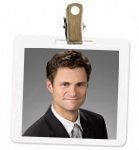Litigation Value: potentially millions when Dunder Mifflin/Saber tries to assert ownership rights over the Stapler-Marker or scented pink paper.
In an unusual deviation from its comic roots, last night’s episode of The Office, “Gettysburg,” tackled a difficult societal issue: the isolation and depression resulting from corporate America treating business like war….. Ok, that’s not true – just making sure you are paying attention. In reality “Gettysburg” was a re-run and typically hilarious. Jaclyn West initially provided great commentary.
One of my favorite moments from the episode involved the “Stapler-Marker.” The idea for this ingenious device bubbled up from the depths of Kevin’s unusual mind. Imagine it: no longer will you have to set down your marker before stapling the document that you are working on to another document. Instead, in one seamless movement, you will mark and then staple. Or you will staple then mark. As Kevin demonstrated, you might even be able to do both tasks at the same time, cutting out endless hours of wasted moments during the day.
Unfortunately, Kevin marked the Stapler-Marker off his list of innovative ideas to present to Robert California and into oblivion (as a side note, I hope this blog entry might inspire a would-be inventor to run with Kevin’s idea). In case you are wondering why Kevin was stretching himself as an inventor, let me provide a little background – Mr. California challenged his employees to come up with a “game changer” that would revolutionize the paper business.
While contemplating the astounding depth and breadth of ideas that blossomed from the Scranton office (including pink scented paper for women that feel the paper business has ignored them, origami, and a masterfully organized snack machine (again, Kevin), I began thinking about what might happen if a dispute arose over who owned the rights to these fabulous inventions.
Generally, an invention belongs to the inventor, and the fact that the inventor is an employee does not mean the employer necessarily has any rights to the invention. It depends on the relationship of the parties and the circumstances under which the invention was developed. When the employee is not hired to invent, but on the employer’s time and with some of the employer’s resources develops an invention that somehow helps the employer, the general rule is that the employer has a “shop right,” which is a nonexclusive license to the use of that invention. The “shop right” doctrine is fragile and of uncertain duration. An employer can ease uncertainty with a written agreement that specifically assigns inventions to the employer. It is preferable to obtain the agreement at the beginning of employment.
So, as it turns out, without an agreement to the contrary, Kevin would likely own the rights to the Stapler-Marker. Dunder Mifflin/Saber could get rich utilizing the device, at least for some time, but Kevin could still sell the invention to the company’s competitors. Judging from the creative juices that are flowing out of Scranton, the company would be wise to get contracts in place that would cover such disputes. If your company is interested in doing the same, the attorneys at Ford & Harrison, LLP, are available to assist in the process.


